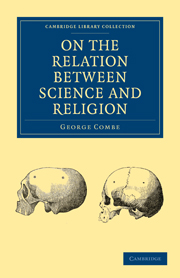Book contents
- Frontmatter
- Contents
- ADVERTISEMENT
- INTRODUCTION
- CHAP. I On the present state of the relation between Science and Religion
- CHAP. II Definition of the words Science and Religion, and Elucidation of the complex character of Religion
- CHAP. III Of Man
- CHAP. IV Of the extent to which Man is able to discover the Ultimate Elements or Essence of the External World
- CHAP. V Of God
- CHAP. VI Can we trace Divine Government in the Phenomena of the Physical and Moral Worlds? And if so, by what means is it maintained and rendered efficient?
- CHAP. VII Historical Evidence that the Divine Government of Nations is Moral
- CHAP. VIII Is this World, such as it now exists, an Institution?—Or is it the Wreck of a better System?
- CHAP. IX Practical Considerations
- CHAP. X Conclusion
- APPENDIX
- Frontmatter
- Contents
- ADVERTISEMENT
- INTRODUCTION
- CHAP. I On the present state of the relation between Science and Religion
- CHAP. II Definition of the words Science and Religion, and Elucidation of the complex character of Religion
- CHAP. III Of Man
- CHAP. IV Of the extent to which Man is able to discover the Ultimate Elements or Essence of the External World
- CHAP. V Of God
- CHAP. VI Can we trace Divine Government in the Phenomena of the Physical and Moral Worlds? And if so, by what means is it maintained and rendered efficient?
- CHAP. VII Historical Evidence that the Divine Government of Nations is Moral
- CHAP. VIII Is this World, such as it now exists, an Institution?—Or is it the Wreck of a better System?
- CHAP. IX Practical Considerations
- CHAP. X Conclusion
- APPENDIX
Summary
In reference to the present condition and future prospects of the Religion of Christendom, the fundamental point to be determined appears to me to be—Whether the world, as it now exists, is merely the wreck of a better system,—or an Institution? If it is the former, I leave to other hands, the task of mending its disjointed parts, and educing from them whatever good they can be made to yield. If it is an Institution,—then, as before remarked, it will be our duty and our interest to regard it with respect as the design of its Author, to try to discover its plan, and to conform to its laws. With this view we may approach the study of it in the following order:—
Human nature will constitute the central point of our investigations; because the adaptations of the world to our capacities, wants, and desires cannot be understood while the latter are unknown. If the views of man's nature, stated in Chapter III., §§ 1 and 2, and elucidated in the Appendix, No. II., be well founded, physiology will form one grand source from which this information will be derived.
If we find evidence, as maintained in Chapter III., § 4, that man is constitutionally a religious being—then we shall see a firm foundation in nature for religion; and if, as stated in § 5, we discover in him organs of the moral emotions, we shall perceive also an indestructible basis for morality.
- Type
- Chapter
- Information
- On the Relation Between Science and Religion , pp. 253 - 260Publisher: Cambridge University PressPrint publication year: 2009First published in: 1857



